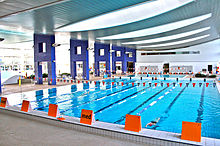
Respiratory risks of indoor swimming pools can include coughing, wheezing, aggravated asthma, and airway hyper-responsiveness (spasms of the bronchial tubes in the lungs causing coughing and chest tightness). The chemicals used for pool water disinfection can react with organic compounds in the water to create disinfection by-products or DBPs. Exposure to these DBPs are the potential cause for respiratory symptoms in swimmers. Multiple studies have shown the potential correlation between chronic exposure to DBPs and respiratory symptoms among competitive swimmers but more research is needed on the effects of these DBPs on recreational swimmers. The studies on recreational swimmers that have been done show a decreased risk for respiratory symptoms due to a decreased exposure to DBPs. Some studies have been done on the vulnerability of younger children and DBP exposure. Studies done on the vulnerability of younger children demonstrate that immature lungs are more likely to absorb more of these DBPs.
References
- Prevention, CDC - Centers for Disease Control and. "CDC - Irritants (Chloramines) & Indoor Pool Air Quality - Pools & Hot Tubs - Healthy Swimming & Recreational Water - Healthy Water". www.cdc.gov. Retrieved 2016-04-08.
- "Is Chlorine in Indoor Swimming Pools Hard on Your Lungs? - Health Essentials from Cleveland Clinic". Health Essentials from Cleveland Clinic. 2015-02-26. Retrieved 2016-04-08.
- "The Management and Treatment of Swimming Pool Water" (PDF). Paramount Pools. Pool Water Treatment Advisory Group. Archived from the original (PDF) on 2020-07-02. Retrieved 2016-07-12.
- Uyan, Z.s.; Carraro, S.; Piacentini, G.; Baraldi, E. (2009-01-01). "Swimming pool, respiratory health, and childhood asthma: Should we change our beliefs?". Pediatric Pulmonology. 44 (1): 31–37. doi:10.1002/ppul.20947. ISSN 1099-0496. PMID 19061232. S2CID 31834864.
- Reynolds, Gretchen (2009-07-22). "Are Indoor Pools Bad for Your Lungs?". Well. Retrieved 2016-04-08.